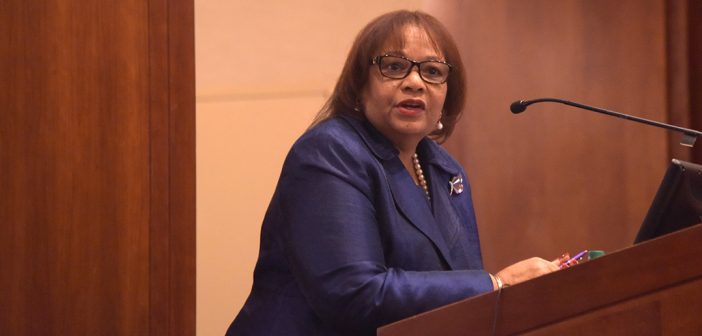“Everybody in this room who has kids knows that the college conversation was never ‘Do you want to go to college?’ It was, ‘What college are you going to go to?’” said Dorita Gibson, Ed.D, the senior deputy chancellor at the New York City Department of Education.
Gibson made the keynote remarks to a group of teachers, principals, academics, and researchers at the Graduate School of Education’s 12th Annual Leadership Conference on Nov. 29.
“But a lot of people don’t know that so many kids from New York City have not been on a college campus. We need to make that a part of their education in grade school,” she said.
In highlighting policies put forth by the de Blasio administration, Gibson spoke in detail of programs that focus on preparing young people for college. She also talked about unofficial practices that help kids stay in college, such as principals and teachers that keep in touch with students after they leave school—whether it’s transitioning from middle school into high school or from high school into college.
She highlighted the Single Shepherd initiative, which pairs every middle- and high-school students in Districts 7 and 23 with a dedicated school counselor or social worker that supports them through graduation and the college enrollment process.
“In college, we need to do a little bit more work with our higher ed partners to make sure we know what to do with our kids when they are struggling in their first year of college,” she said.
Gibson spoke of specific cases of students who made it into college despite growing up in shelters. She said that 50 of those students even got into colleges that were far away from home. Of them, just two dropped out.
“I sent two people to go find these kids and try to get them back into college because they made it with all the obstacles that they had living in shelters,” she said. “It only takes one little thing to slip back.”
She said that going away to college was difficult even in the best of circumstances, but it was more so for at-risk students.
“No matter how much you think you have it together and no matter if you come from a tight-knit family, being in a strange environment with strange people is not easy,” she said. “You miss your bed … you miss your mom’s cooking.”
She said that students coming from at-risk backgrounds often view college as an escape rather than an opportunity to learn, but then find that being different from other students is far more difficult.
“It’s easy to go back to where it’s comfortable—even if it’s a shelter,” she said. “That’s why the mentoring piece is so hard and why we as a school system need to figure out how to bridge that first-year gap. Once they get past the first year, it’s smooth sailing.”



